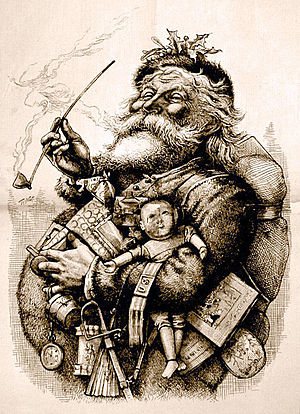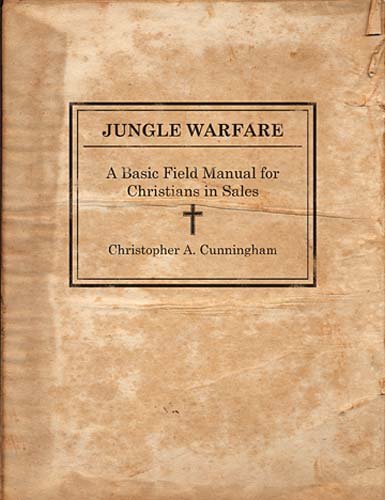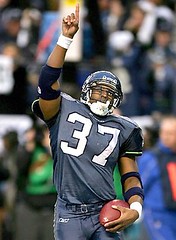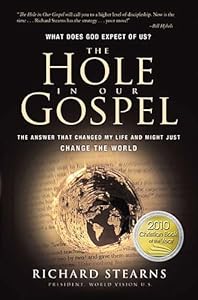 Image via Wikipedia
Image via Wikipedia Some of you might be thinking just where did I hear that song...what movie was that??? Well, that answer was Dirty Dancing.
This post, however, is not about the song, but about a specific verse from the gospel of John - chapter 21, verse 15 to be specific.
So when they had dined, Jesus saith to Simon Peter, Simon, son of Jonas, lovest thou me more than these? He saith unto him, Yea, Lord; thou knowest that I love thee. He saith unto him, Feed my lambs.
- Peter experiences Jesus healing his mother-in-law from a fever,
- Peter hears Jesus preach the Beatitudes to the people,
- Peter sees Jesus heal lots of people,
- Peter feels the tension as Jesus confronts the Pharisees and religious leaders of the day,
- Peter watches Jesus deliver many people of demons by the raw power of God,
- Peter is one of 3 who see Jesus bring life back into a dead girl’s body,
- Peter testifies "You are the Christ, the Son of the living God." ,
- Peter walked on water - holds the Guiness record for distance travelled,
- Peter is 1 of 3 that ascends the Mount of Transfiguration with Jesus,
- Peter declares, "Even if I have to die with you, I will never disown you.",
- Peter blows it – Sleep overcomes him in the Garden of Gethsemene,
- Peter blows it again - He cuts off the ear of Malchus, a servant of the high priest,
- Peter blows it again - He denies Christ three times during his arrest and trial
Getting back to our story, Christ has been crucified and has risen. He has shown himself to his followers on several occasions. Simon Peter, Thomas (called Didymus), Nathanael from Cana in Galilee, the sons of Zebedee, and two other disciples were together. "I'm going out to fish," Simon Peter told them, and they said, "We'll go with you." So they went out and got into the boat, but that night they caught nothing. Early in the morning, Jesus stood on the shore, but the disciples did not realize that it was Jesus. He called out to them, "Friends, haven't you any fish?" "No," they answered. He said, "Throw your net on the right side of the boat and you will find some." When they did, they were unable to haul the net in because of the large number of fish. Then the disciple whom Jesus loved said to Peter, "It is the Lord!" As soon as Simon Peter heard him say, "It is the Lord," he wrapped his outer garment around him (for he had taken it off) and jumped into the water. "Come and have breakfast. I've got a fish fry going on over here."
It is at this point that Christ asks Peter the magic question - "Do you love me?" The most interesting part of this question is that, even after the seemingly proper response is given by Peter, Christ would ask this question twice more. Why? Surely this resurrection ordeal had not compromised his hearing or comprehension. For what purpose would the King of Kings badger Peter over a question about Love?
This is one of those times where a Greek dictionary is vital to complete understanding of the Holy Scriptures. In the first two questions, the word used for "love" is αγαπάω , transliterated as agapaō. You may have heard of "agape love". You may have heard the expression, "Standing with mouth agape". Both of these are related through this word agape. Simply put, it means, wide open, or unrestrained. C. S. Lewis, in his book The Four Loves, used agape to describe what he believed was the highest level of love known to humanity—a selfless love, a love that was passionately committed to the well-being of the other. Christian writers have generally described agape as a form of love which is both unconditional and voluntary. Tertullian, in his 2nd century defense of Christians, remarks how Christian love attracted pagan notice: "What marks us in the eyes of our enemies is our loving kindness. 'Only look,' they say, 'look how they love one another.'"
Now we start to understand what Christ was really asking Peter. "Peter, is there anything keeping you from an unconstrained love of me? Can you love me with all that is within you?" Peter responds twice, "Of course I do! Pass the fish, please! Got any ketchup for these hush puppies?" The impetuous Peter was starting to surface. He was focused on eating. Why did he have to answer that question twice? And what did He mean by "Let my sheep graze?"
A third time, Christ challenges this dithering disciple.
He saith unto him the third time, Simon, son of Jonas, lovest thou me? Peter was grieved because he said unto him the third time, Lovest thou me? And he said unto him, Lord, thou knowest all things; thou knowest that I love thee. Jesus saith unto him, Feed my sheep.
This time, there is a different Greek word used for "love" - φιλέω, transliterated as phileō. This word serves as the root for the U.S. city of brotherly love, Philadelphia. Funny thing is that Peter's previous two answers that he loved Christ used this word, phileo. Twice, Christ has asked Peter about unconditional, unconstrained love. Twice, Peter has responded, "C'mon, man! You know I love ya like a brother!"
Phileo love is the kind of love that makes agape love enjoyable. Phileo love is having tender affection toward your mate. Most friendships are built on phileo love. Phileo love is that "something" that you see in another person that draws you to be their friend. It's one thing to unconditionally love (agape) someone who you don't like to be around because they irritate you. It's quite another thing to unconditionally love someone who is tenderly affectionate (phileo) toward you. THE TENDER AFFECTION OF PHILEO LOVE MAKES THE UNCONDITIONAL LOVE OF AGAPE ENJOYABLE. It's the joy of the friendship!
Just imagine - the King of Kings acting like Mr. Rogers and asking Peter, "Won't you be my neighbor?" Do you love me like a brother? Can I call you friend? Wow! The majesty of this moment, shared over the fellowship of food, cannot be understated. The risen Messiah is hosting a fish fry and asking these disciples to PROVE their love to him by offering themselves in service to Him. Each affirmative response by Peter is met with "Feed my sheep". Christ had offered himself in the most perfect apotheosis of agape love:
But God commendeth his love toward us, in that, while we were yet sinners, Christ died for us. Romans 5:8Yes, that love word is agape. He gave his best. He was born for this. His life consisted of preparation to become the ultimate sacrifice for us. Like He did to Peter, He will tell us, "If you love me, feed my sheep!" How are we supposed to feed His sheep? Simply by telling them the truth - there is One who loves them. There is one who cares for them and wants to see them prosper. There is one who died for them to procure permanent, perpetual peace. He wants us to spread the Good News! Back to that song we started with - perhaps there are hints in the limited lyrics to His wishes. Did you know that the word "work" appears 37 times in that song?
On this Christmas day, Christ is asking, "Do you love me?"























![Reblog this post [with Zemanta]](http://img.zemanta.com/reblog_e.png?x-id=c4a5a0c9-8369-43a2-92e9-cd30087baaa9)

![Reblog this post [with Zemanta]](http://img.zemanta.com/reblog_e.png?x-id=5f11742b-5a70-43a0-b010-22e9214e3249)



![Reblog this post [with Zemanta]](http://img.zemanta.com/reblog_e.png?x-id=b6125b91-dae0-4a70-83e6-263b34bca81b)

![Reblog this post [with Zemanta]](http://img.zemanta.com/reblog_e.png?x-id=41a7e5d0-c905-490f-89f5-600e9acdf5d8)

![Reblog this post [with Zemanta]](http://img.zemanta.com/reblog_e.png?x-id=377c8a77-7fc8-401f-8bb8-061f7f19db31)

![Reblog this post [with Zemanta]](http://img.zemanta.com/reblog_e.png?x-id=84db3f00-2997-4355-8eba-80e8826eee0d)

















